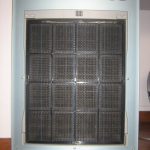People often confuse air purifiers and dehumidifiers, not realizing that they have different functions. However, both devices are fantastic solutions for people who suffer from allergies or have asthma. They both improve the quality of the air inside of your home and minimize allergens.

What are allergens? According to Kathryn Edwards, expert allergist from New Jersey, the most common allergens include:
- Pollens, molds, and dust mites
- Pet dander and hair
- Specific foods, such as peanuts, tree nuts, milk, and shellfish
- Medicines
If you notice that your nose or throat becomes irritated every time you enter your home or a specific room, it is a sign that you may need to purchase an air purifier or dehumidifier, depending on the cause of the irritation.
Continue reading to find out how they work and which device would be the best for your specific needs.
Air Purifier
Function: Air purifiers remove the allergens inside your home by circulating the air through filters. This process will remove irritants such as mold, smoke, dust, pet dander, and pollen.
The amount of debris and contaminants that your air purifier removes will depend on the type of filter that you use. Using a HEPA filter will capture up to 99.97% of irritants that are sized up to 0.3 microns. Also, if your home is experiencing mold, an Activated Carbon Filter will eliminate the smells that it causes.
Furthermore, the range of your air purifier is determined by which size you get. You have the option to get an air purifier that is installed through your air conditioning unit or you can get a portable one that will just clean the air in one room.
Types: There are different types of air purifiers that you can purchase on the market. The kind that you purchase will affect how the air purifier functions and the range that it will reach.
- Filter air purifiers: This type of air purifier will use a filter to clean the air. You can get either HEPA filters or ULPA filters and they will be good for trapping dust and allergens.
- Ozone generators: These purifiers create ozone gas to deodorize and disinfect the air. However, you must be cautious with this type of purifier because the gas that they produce is toxic and can damage your lungs.
- Ionizing purifiers: This purifier releases charged ions into the air by using corona discharge. The ions then attach to the irritants then collect them into an oppositely-charged flat plate.
- UV Light: This method of purifying uses UV or ultraviolet light to eliminate toxins.
- Adsorbents: If you need to get rid of bad smells, gases, or fumes, you should consider purchasing adsorbents purifiers. This method removes contaminants by sucking them into a porous solid material.
Maintenance: If you purchase an air purifier, you should change the filter every 6 months.
Humidifier
What a Humidifier does: If you live in a particularly humid climate, you may want to consider getting a dehumidifier. They differ from air purifiers because they do not filter the air but they do remove mold and dust mites that thrive in moist environments. They eliminate these allergens by reducing the humidity below 50%, making their surroundings inhabitable.
Types: When looking for a dehumidifier, you will most likely see both warm mist and cool mist models and both lower the amount of humidity in the air. However, there are several versions of dehumidifiers out there that you can choose:
- HVAC: Your air conditioner can be a dehumidifier because it cools the air. Also, you could consider purchasing a window unit as well if you need to cool a specific room.
- Electronic dehumidifier: If you need to dehumidify a small space, consider an electronic one. It will condense water vapor from the air using a heat pump.
- Ionic membrane: This dehumidifier is primarily used in industrial areas. It removes moisture out of the air at a molecular level by using an ionic pump.
Maintenance: If you purchase a dehumidifier, you must clean the coils periodically. If your dehumidifier has plates, be sure to clean those as well. Also, if you are using a window air conditioner, you may need to check them for frost as well.
Which is Best for Your Needs?
Purchasing an air purifier is best for you if you meet the following conditions:
- You have allergies, asthma, other breathing problems and you need to eliminate any irritants in the air
- If you have pets and you need to decrease pet dander
- If your house tends to collect a lot of dust
- If you are a smoker, have pets, or you have mold and you need to eliminate their odors
Purchasing an air purifier is best for you if you need the following conditions:
- If one of your rooms has a bad smell that you need to eliminate
- If you have dust mites
- Excess humidity makes it difficult for you to breathe
- You live in a hot and humid climate and you need an alternative to air conditioning
Also, be aware that you can use both in the same area. The air purifier will take care of the allergens in the room while the dehumidifier will remove the moisture from the air, making it harder for the allergens to return.







